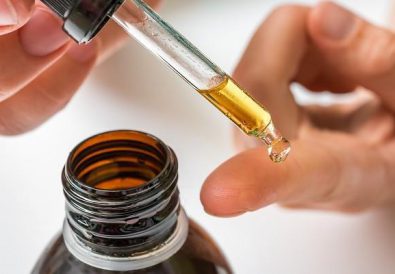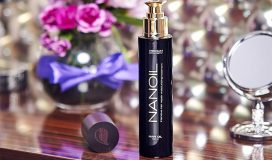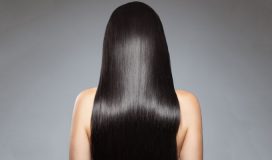My skin is sensitive which makes the care quite problematic. Dermatologists define it as a skin that overreacts to various factors. The worst thing is that neither these factors nor the skin reaction can be predicted because they are different for every human being. Fortunately, proper skin care will reduce the tendency to irritation and visibly improve its condition. How to identify and nurture sensitive skin? What causes sensitive skin? What are the most common mistakes in sensitive skin care? Here are my recipes for homemade cosmetics for sensitive skin.
How to identify sensitive skin?
The most common symptoms of sensitive skin can be objective (visible to the naked eye) and subjective (felt). The objective symptoms include redness, flaking, dryness, and swelling of the skin, and subjective symptoms – the impression of itching, burning, stinging or tingling. The intensity of these impressions is an individual matter: while one person barely senses them, for others, they may be unbearable. This is a consequence of differences in the number of receptors found in the skin; they inform the brain about the inflammatory process.
Furthermore, the severity of symptoms depends on the factor that caused them. If their cause is a disease, for example, atopic dermatitis, the symptoms will be stronger. According to the CERIES classification (Epidermal and Sensory Research and Investigation Center of CHANEL), we can distinguish four types of sensitive skin:
- the first type is revealed by erythema associated with stress and other emotional experiences, sudden temperature change, diet or alcohol consumption;
- the second type you will recognize by erythema, the feeling of tightening and peeling of the skin, which are a reaction to unfavorable climatic conditions, including air-conditioning;
- the third type is manifested by a sudden redness, tingling and a feeling of tight skin, which occurs due to the use of some cosmetics;
- type four is defined as skin redness associated with menstruation.
Sensitive skin – causes
Sensitive skin may have a genetic basis or be a consequence of diseases such as atopic or seborrheic dermatitis or rosacea – then, it is connected with an improperly built epidermis or its damage. Sometimes, it happens that healthy skin suddenly becomes sensitive, that is, it reacts badly to what previously did not harm it. Why? They are at least two reasons:
- changing the threshold of skin strength, which results from long-term improper care;
- hormonal changes, especially during pregnancy or immediately before menstruation.
Sensitive skin at a mature age is a rarity, as with age, the level of epidermis and dermis’ innervation decreases.
How to take care of sensitive skin?
In the care of all skin types, the right selection of cosmetics is the most important step. In the case of sensitive skin, the best solution is to go for pharmaceutical preparations dedicated either to this particular skin type, or overactive or atopic skin. They are created in cooperation with dermatologists, therefore, in their composition, you will not find any allergens or fragrances that could cause an unwanted reaction of the skin. Those of you who, like me, have sensitive skin are probably aware that it is difficult to determine what harms it. For this reason, choose cosmetics with the least amount of ingredients – this will reduce the risk of irritation.
Sensitive skin care
Makeup cosmetics
To cleanse my face and remove makeup, I use mild micellar water, which I also recommend to everyone.
Face creams
Day cream for sensitive skin should protect it from harmful external factors, for example, atmospheric. It must contain a minimum of 15 SPF; the optimal solution will be a physical filter that does not penetrate the skin but stays on its surface. In addition, it is better tolerated by sensitive skin than a chemical filter.
However, the night cream should regenerate sensitive skin and soothe irritation.
Exfoliating scrub and a mask
Once a week, it is worth doing an enzyme peeling, which dissolves bonds between dead skin cells instead of abrading them mechanically. Peeling will prepare the skin for applying the mask, which will soften erythema and strengthen the skin.
Recipes for homemade cosmetics for sensitive skin
Recipe for a bath with oak bark for skin inflammation
The oak bark cleanses the skin of bacteria and has soothing properties.
Ingredients:
- a few pieces of oak bark,
- 2 liters of boiling water.
Directions:
To prepare this bath, shred the bark to get five tablespoons of herbs. Then, pour boiling water over it and cook for 8-12 minutes. Strain it, pour it into the bathtub and bathe for 20 minutes.
Recipe for a juniper bath for a skin rash
Ingredients:
- 1 kg of young branches of juniper,
- a few juniper berries,
- 2 liters of water.
Directions:
Pour boiling water over the branches and juniper berries. Cook for 5 minutes, then pour through the strainer to separate the decoction of the herbs. Pour the refreshing infusion into the tub and bathe for 15 minutes.
Mistakes in the care of sensitive skin
Factors that don’t cause the slightest reaction on normal skin, can be very harmful to sensitive skin type. We are talking about:
- exogenous factors, that is everything that comes from outside and has direct contact with the skin (among others, these are atmospheric factors, hard water or nutrients);
- endogenous factors that result from the body’s work and have an effect on its condition (for example stress, hormones or in the case of atopic dermatitis – sweat that intensifies inflammatory changes).
The most common mistakes in sensitive skin care include:
- Rubbing
Rubbing the skin, for instance, when towel-drying, deprives it of the thin, protective lipid layer - Using too strong cosmetics
Sensitive skin does not take rejuvenating treatment well, especially with active ingredients, such as retinol or vitamin C. - Using a few creams at once
The ingredients contained in various creams can mix with one another and create a blend of hard-to-forsee effects – of be simply ineffective. - Changing the cosmetics too often
Each cosmetic requires time to do its job. A quick change in only suggested when you feel that the product irritated the skin. - Experimenting with new cosmetics during inflammation
Applying a new cream to skin that’s been irritated by the previous product can cause more harm than good by intensifying the inflammation. - Using herbal infusions
Herbs that are famous for their beneficial qualities may harm sensitive skin by causing allergic reactions.
How do YOU take care of your sensitive skin? Do you go for ready-made, drugstore cosmetics or prefer making them on your own? Please, share your own recipes!
















Leave a Reply